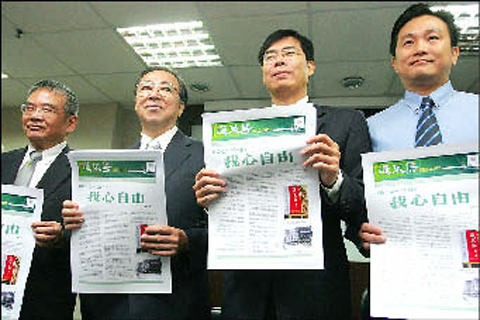The magazine Neo Formosa Weekly (蓬萊島雜誌) resumed publication in electronic form yesterday with the aim of revitalizing the push for an independent republic.
Founded by Huang Tien-fu (黃天福) in 1984, Neo Formosa Weekly published 52 issues, 51 of which were banned. Former president of the magazine Chen Shui-bian (陳水扁), former editor-in-chief Lee Yi-yang (李逸洋) and Huang were imprisoned for publishing an article that said former New Party lawmaker Elmer Feng’s (馮滬祥) doctoral dissertation was plagiarized.
Feng filed libel charges against the magazine. While Chen’s appeal against the conviction was pending, he left his post as a Taipei City councilor and returned to his home county of Tainan to run for county commissioner. Chen lost the election by a handful of votes and his supporters alleged that the vote had been rigged by the electoral authorities.

PHOTO: CNA
The magazine’s president, Chen Chi-mai (陳其邁), a former deputy secretary-general at the Presidential Office, said yesterday the goal of the magazine was clear — to protect Taiwan’s sovereignty and to build a new, independent republic.
Describing this year as full of misery, Chen Chi-mai said Taiwan had not only suffered the deadliest flooding in 50 years, but had also seen damage to its sovereignty, democracy and human rights since the Chinese Nationalist Party (KMT) returned to power.
“The corruption cases brought against former president Chen [Shui-bian] are a perfect example of political interference in legal cases,” he said.
While the dangwai (黨外,“outside the KMT”) opposition movement of the 1980s sought to strive for freedom of speech and the freedom to form political parties, Chen Chi-mai said it was necessary to restore the “dangwai spirit” and consolidate public opinion. The magazine’s old office in Kaohsiung has been chosen as the headquarters and Chen Chi-mai said it also hoped to establish branch offices elsewhere.
Magazine editor-in-chief Wang Ding-yu (王定宇), a Tainan City councilor, said the magazine was a communication platform and a tool to organize opposition forces.
“We may be small, but we will not easily back down if the administration continues to ignore the public opinion,” he said.
Huang said the then-KMT administration of the 1980s imposed severe punishments on Neo Formosa Weekly, sentencing the publication’s managers to jail and slapping a NT$2 million fine on the cash-strapped magazine.
“We later learned from declassified documents that the KMT government planned to wipe out the publication,” he said.
Things are different now, he said, but the aim of the magazine would remain the same — to protect Taiwan-centered consciousness and report on the erroneous, unfair and unjust.
Those interested in contributing articles or photographs can find out more information on the Web at www.formosanews.tw.

A preclearance service to facilitate entry for people traveling to select airports in Japan would be available from Thursday next week to Feb. 25 at Taiwan Taoyuan International Airport, Taoyuan International Airport Corp (TIAC) said on Tuesday. The service was first made available to Taiwanese travelers throughout the winter vacation of 2024 and during the Lunar New Year holiday. In addition to flights to the Japanese cities of Hakodate, Asahikawa, Akita, Sendai, Niigata, Okayama, Takamatsu, Kumamoto and Kagoshima, the service would be available to travelers to Kobe and Oita. The service can be accessed by passengers of 15 flight routes operated by

Alain Robert, known as the "French Spider-Man," praised Alex Honnold as exceptionally well-prepared after the US climber completed a free solo ascent of Taipei 101 yesterday. Robert said Honnold's ascent of the 508m-tall skyscraper in just more than one-and-a-half hours without using safety ropes or equipment was a remarkable achievement. "This is my life," he said in an interview conducted in French, adding that he liked the feeling of being "on the edge of danger." The 63-year-old Frenchman climbed Taipei 101 using ropes in December 2004, taking about four hours to reach the top. On a one-to-10 scale of difficulty, Robert said Taipei 101

MORE FALL: An investigation into one of Xi’s key cronies, part of a broader ‘anti-corruption’ drive, indicates that he might have a deep distrust in the military, an expert said China’s latest military purge underscores systemic risks in its shift from collective leadership to sole rule under Chinese President Xi Jinping (習近平), and could disrupt its chain of command and military capabilities, a national security official said yesterday. If decisionmaking within the Chinese Communist Party has become “irrational” under one-man rule, the Taiwan Strait and the regional situation must be approached with extreme caution, given unforeseen risks, they added. The anonymous official made the remarks as China’s Central Military Commission Vice Chairman Zhang Youxia (張又俠) and Joint Staff Department Chief of Staff Liu Zhenli (劉振立) were reportedly being investigated for suspected “serious

Taiwanese and US defense groups are collaborating to introduce deployable, semi-autonomous manufacturing systems for drones and components in a boost to the nation’s supply chain resilience. Taiwan’s G-Tech Optroelectronics Corp subsidiary GTOC and the US’ Aerkomm Inc on Friday announced an agreement with fellow US-based Firestorm Lab to adopt the latter’s xCell, a technology featuring 3D printers fitted in 6.1m container units. The systems enable aerial platforms and parts to be produced in high volumes from dispersed nodes capable of rapid redeployment, to minimize the risk of enemy strikes and to meet field requirements, they said. Firestorm chief technology officer Ian Muceus said